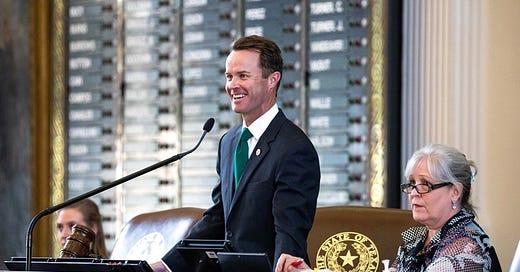Speaker Battles Are Not Limited to Washington
A determined faction of the Texas GOP wants to get rid of House Speaker Dade Phelan and his bipartisan ways. Could they do it?
Welcome to another edition of Life Its Ownself! Please subscribe and encourage others to do so. Your support inspires me to write and publish regularly. All my content is free, but your paid subscription is a big affirmation. Please let me know how I’m doing by 1) liking, 2) subscribing, 3) sharing with others, and 4) commenting below.
Tuesday, October 17, 2023, 9:00 a.m.
The ongoing fustercluck in the U.S. House of Representatives counsels us to be grateful for the relative functionality of the Texas House of Representatives, even as it takes on divisive issues like vouchers and border security. However, the comparative calm of the Texas House is under attack. Speaker Dade Phelan’s role in the impeachment of Twice-Indicted, Impeached and Acquitted But Still Sleazy Attorney General Ken Paxton has painted a large, right-wing target on his back. The pressure will get worse as the Governor’s campaign to pass vouchers puts scrutiny, and pressure, on the House.
(Speaker Dade Phelan presides over a session of the Texas House of Representatives this spring.)
Fear and Loathing in Washington, D.C.
As most sentient Americans know, the U.S. House of Representatives has been without a Speaker since eight Freedom Caucus-types defenestrated Kevin McCarthy (R-Mar-a-Lago) two weeks ago. (I would say the House was “leaderless,” but it has clearly been leaderless since the beginning of McCarthy’s reign last January.)
(The Chamber of the U.S. House of Representatives)
The House is scheduled to hold a vote today on whether Rep. Jim Jordan (R-Enabler) should become Speaker. Jordan’s unfitness for the office is one of the most well-documented realities of modern American politics. He may succeed anyway, due in part to fierce lobbying – some would say bullying – by MAGA celebrities like Donald Trump and Sean Hannity. He needs 218 votes from the Republican caucus and has so far gotten only 152 in internal balloting. Over the weekend, though, several “no” votes shifted to “yes,” including once respectable Rep. Michael McCaul (R-Quisling), who “said he would vote for Jordan after the two discussed possibly introducing a supplemental funding package that would include aid for Israel, Ukraine, Taiwan and the U.S.-Mexico border.” (emphasis mine)
Besides the bullying and intimidation, former CNN correspondent Chris Cillizza thinks Jordan has an advantage: it’s not the crazies that don’t like him, it’s the “normies,” whose No. 1 priority is re-election and retaining their power in the House. (McCaul, for instance, is chair of the House Foreign Affairs Committee, a job he’d like to keep.) Their priority is survival, and they will accede to Jordan’s election if they think it’s necessary.
Of course, the Democratic caucus – 212 members – is unanimous in its opposition to him (or any other Republican, at least so far). In a closely divided House, their unified front makes Jordan’s elevation even that more challenging.
Meanwhile, in Austin …
(The Chamber of the Texas House of Representatives)
That is not the case in the Texas House, where a bipartisan coalition has elected Speakers for at least 25 years. Democrat Pete Laney, when he was Speaker in the 1990s, gave key committee chairmanships to Republicans (including Tom Craddick, who deposed him in 2003). Craddick’s election as Speaker was more reliant on GOP support, although he had some help from the “Craddick Ds.” Craddick’s governing style and agenda did not foster buy-in from Democrats.
Or, it turned out, from a key group of moderate Republicans, who eventually sought to depose him at the end of the 2007 session. After Craddick refused to allow a motion to declare the chair vacant, his parliamentarians resigned in protest and there was open rebellion on the floor. He survived that, but it was clear he would not be re-elected Speaker in 2009.
Meanwhile, Republicans had lost House seats in the 2006 and 2008 elections, such that in January of 2009 the House was almost equally divided, with 76 Republicans and 74 Democrats. They elected a “consensus” Speaker, Joe Straus of San Antonio, who led the House for a decade. Straus ruled the House as a moderate conservative, even after Republicans won a huge majority after the 2010 redistricting.
Meanwhile, an edgier politics among Texas Republicans led to the formation in 2017 of a Freedom Caucus whose main agenda was to eliminate bipartisanship and push the House to the right. The Freedom Caucus still exists, although its membership has dwindled to 11. They are pressing their grievances, including Phelan’s predilection for appointing Democrats as committee chairs. The Texas Scorecard, a website funded by archconservative Tim Dunn, has a video about how House Democrats have blunted GOP initiatives like vouchers. House Freedom Caucus members have called for the suspension of House Parliamentarian Hugh Brady on grounds of – gasp! – consorting with Democrats.
The tip of the spear in their efforts to undermine Phelan has been Rep. Tony Tinderholt (R-Arlington), who lost a Speaker’s race to Phelan last January by a vote of 143-3. Tinderholt’s favorite tactic of late has been to make “parliamentary inquiries” – typically, questions asked by lawmakers to clarify rules or procedures – that are designed to litigate Freedom Caucus issues not before the House or to put Phelan on the spot. In response, last Thursday Phelan restricted Tinderholt’s ability to make parliamentary inquiries, saying he must clear them with the Speaker or parliamentarian first. In response, Tinderholt has asked for clarification on the proper procedure for firing the Speaker.
Because the coalition that supports Phelan is broad and bipartisan, it’s unlikely that Tinderholt et al. will dislodge him. But Abbott seems bound and determined to pass a voucher bill. Democrats and a significant number of House Republicans oppose vouchers. Pro-voucher forces blame Phelan for some of this obstruction – he says he’s letting his members vote their districts – and the pressure is likely to ratchet up over time.
Phelan’s speakership will be an issue in some GOP House primaries next spring. A direct challenge to Phelan in his Beaumont-area district is also likely. Expect Dan Patrick, Ken Paxton and groups like Defend Texas Liberty PAC to fund and otherwise support those efforts.
Phelan touts his record as a committed conservative, and says the House passed the most conservative legislative program in its history this year. Will that be enough to get him re-elected, both in Beaumont and to the Speaker’s chair?
Follow-up on a Life Its Ownself story …
Last week I wrote about Colony Ridge, the Liberty County subdivision labeled as “one of the largest illegal alien settlements in America.” Doing something about Colony Ridge has been added to the special session agenda, even though the Colony Ridge developers are playing by the state’s rules. Now Texas Monthly investigates and finds that Colony Ridge is not the drug cartel hellhole it’s been made out to be.







With all these pushes toward extremist exclusivity in the GOP, I'm reminded of LBJ's advocacy of inclusiveness in the Democratic Party. "I'd rather have 'em inside the tent pissin' out than outside the tent pissin' in." (I hope the paraphrase is close enough.)